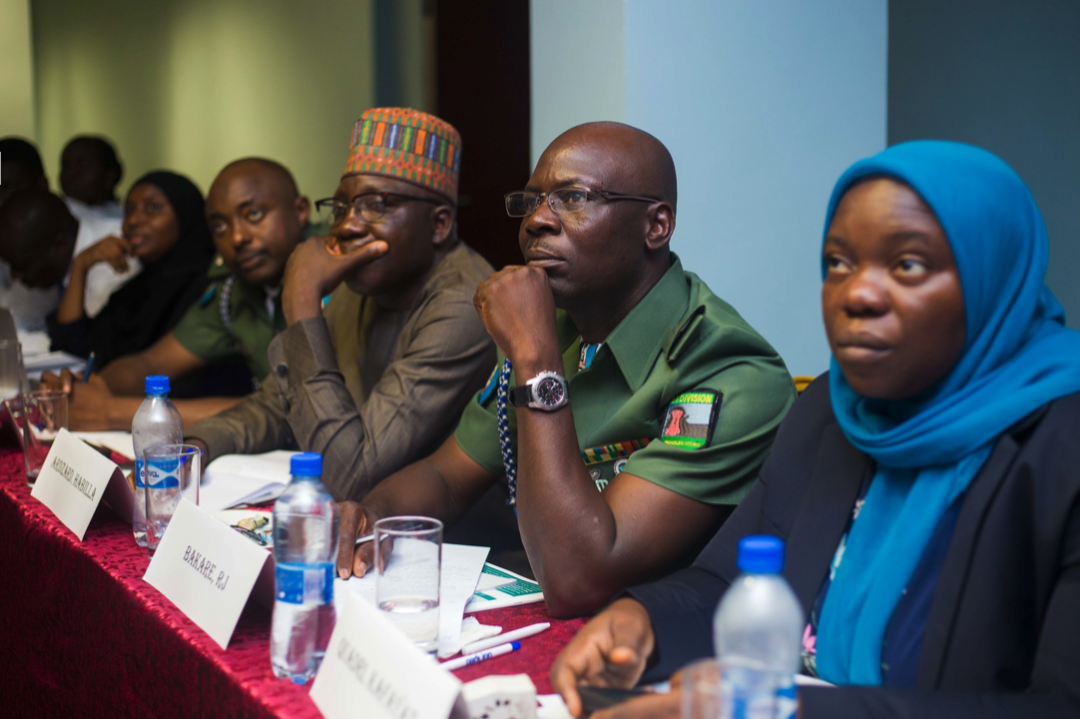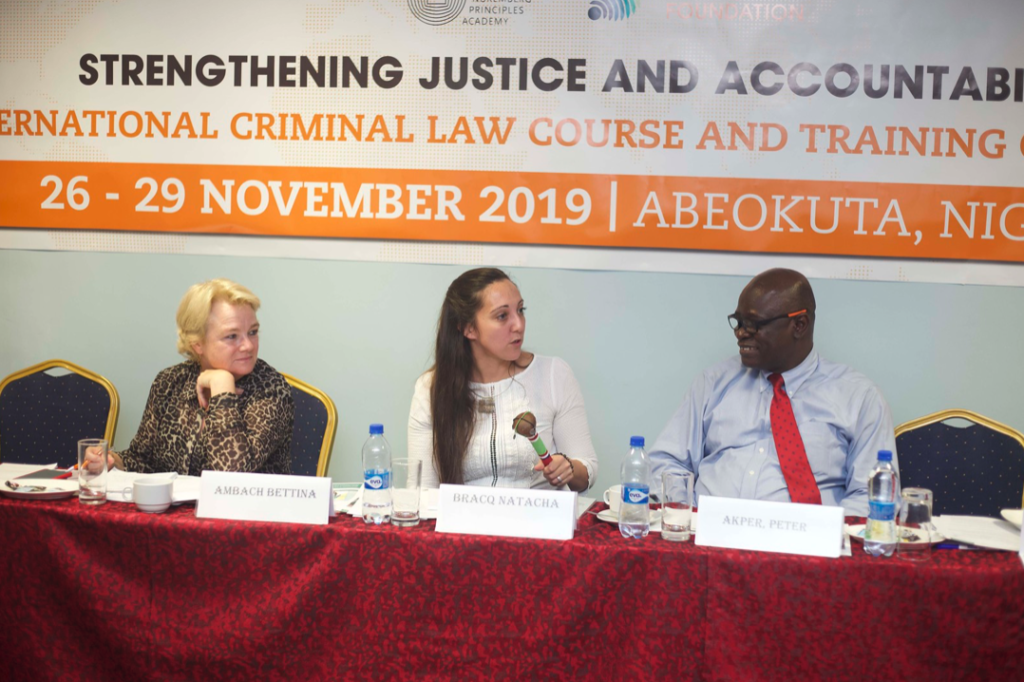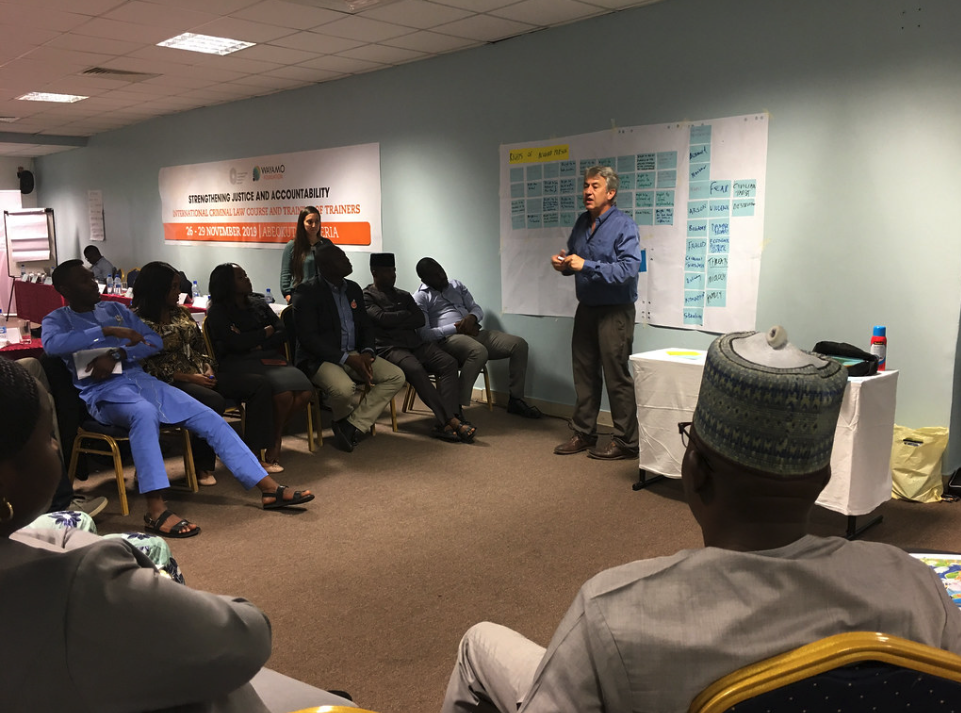26-29 November 2019, Abeokuta, Nigeria
Click here for all pictures.
To supplement and sustain their ongoing capacity-building efforts in Nigeria, the Wayamo Foundation and the International Nuremberg Principles Academy held the first of two international criminal law courses with a training-of-trainers (ToT) component. The objective of the ToT programme is to support and further equip selected institutions with the necessary skills in and knowledge of international criminal law to pass on to their network of relevant legal actors around Nigeria.
The course was attended by handpicked members of all three branches of the Nigerian Armed Forces and participants from the Nigerian Institute of Advanced Legal Studies (NIALS) and National Judicial Institute (NJI). The event was officially opened by Wayamo Foundation Director, Bettina Ambach, and Natacha Bracq in her capacity as Senior Officer for Training and Capacity Building at the International Nuremberg Principles Academy. They welcomed the participants and thanked them for making the effort to travel across the country to the training venue in Abeokuta, the capital of Ogun State.
Philipp Ambach, Head ofthe Victims Participation and Reparations Section at the International Criminal Court (ICC), initiated the proceedings with an informative introduction to international criminal law, and a detailed review of the ICC and how it operates. Having laid the international law foundation, he then handed over to International Human Rights and Training Consultant, Pieter Cronje, for the first of four ToT sessions to be held over the course of the week. Cronje reminded the participants of effective training techniques and provided useful teaching tools. Natacha Bracq concluded the first day with a session on legal research, showing how and where to access international judgments and other legal tools.
Day two began with NIALS Research Professor, Peter Akper, updating the participants on the status of domestication of the Rome Statute in Nigeria and shedding light on the existing synergies between Nigerian law and international criminal law as the nation continues to tackle terrorism and international crimes. Mr. Akper not only highlighted the challenges facing the domestication process and the domestic prosecution of crimes of international concern, but also listed a series of recommendations aimed at improving the situation, including progressive law reform and the creation of the International Crimes Division in the country’s Federal High Court.
He was followed by Wayamo’s Senior International Criminal Justice Lawyer, Angela Mudukuti, who took the participants through the fundamentals of universal jurisdiction and provided different examples of how core international crimes have been prosecuted in various parts of Africa. Taking over for what remained of the day, Adejoké Babington-Ashaye, international law specialist and former ICC investigator, and Akingbolahan Adeniran, Special Adviser (Legal) to the Governor of Ogun State, explained the intricacies of modes of liability, challenging the participants to think “outside the box”. Lastly, Ms. Babington-Ashaye concluded her contribution to the course, by thoroughly explaining the investigation and prosecution of sexual and gender-based violence in international criminal law.
The first session on day three was devoted to victims in international law, with Philipp Ambach setting out the duties and responsibilities of his section at the ICC. Tasked with explaining complex aspects of international humanitarian law, Professor Ray Murphy from the Irish Centre for Human Rights at the National University of Ireland Galway, used a set of powerful photographs and case studies to stress, amongst other things, the horrors of war and the need to protect civilian lives.
Other topics addressed on the final day included international fair trial standards and defendant’s rights during criminal proceedings. Focusing on the domestic challenges to fair trials, Adebayo Akinlade, Chair of the Ikorodu Branch of the Nigerian Bar Association, and National Convener of the Fight against Corruption in the Judiciary, engaged in lively exchanges with the participants. Further contributions included a look at the Kainji Trials by NJI Senior Studies Fellow, Ajibolu Afolabi,and an overview and explanation of the Nigerian Court-martial system by Army Major R.J. Bakare.
The course was a resounding success, and was characterised throughout by the active participation and engagement of all those involved.
The second course is scheduled to take place in early 2020.





